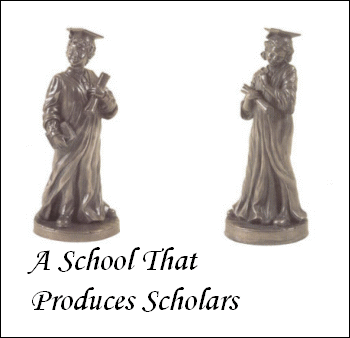The average education level of parents and siblings in homes of 75% of this school's students is High School and below. The families' incomes are subsistent. There are no library books or daily reputable newspapers or news magazines in the homes. Standard English is not spoken and parents do not control/select television programs that are conducive to their children's academic and character development. Survival and securing the essentials of life is the dominant focus, and this concept is taught verbally and by example. Regardless of these circumstances, parents want their children to get an education, enjoy a comfortable lifestyle, define a purpose for their lives, and help others.
To counteract the negative early formative home experiences of these students, this school's staff act as surrogate parents and design a classroom environment, beginning with early childhood programs, to include (missing in their homes) higher education encyclopedia, reputable newspapers, U.S. Constitution, and internet access. The students consistently speak Standard English, and are corrected to do so. Continue to have the traditional early childhood basics - alphabet, simple vocabulary books, puzzles, posters, etc. in the classroom. Therefore, teachers daily schedule time to hands-on higher education resources.
Moreover, we structure children to use higher education dictionaries daily to look up the meaning and the accompanying phonetic spelling of the words to sound out correct pronunciation. Understanding the meaning of words and sounding of words phonetically in a college level dictionary is the key to a student learning to read fluently at any age. This technique should begin with pre-k students. Children of educated parents hear, from birth, Standard English and adult language vernacular to their parents' professions. Thus it becomes second nature for offspring of the educated to use sophisticated vocabulary in communicating.
As for Mathematics and Science, only teachers who hold degrees in Mathematic and Science, who are patient and can communicate abstract concepts in simplified terms that are understandable by the least inclined mind, teach at HICS.
HICS students are expected to adhere to a standard of truth, patience, faith, joy, peace, meekness and self-control. Understanding that self-application of these principles must supercede systems of politics, nationalities, and economics.
Beneath the rigors of the curriculum and the structure of the code of conduct imposed upon each student lies the heart of the program: love. As it is defined in the New Testament, First Corinthians, chapter 13, love involves the highest level of respect and the deepest level of commitment. Love shapes the foundation of the school's commitment to each child and its belief that each one can succeed through faith, patience, discipline, and trust in the God-defined pace for each individual. This approach is realized in the school's determination to work with children who have social, academic, and financial challenges. The school expects them to succeed.
NOTICE OF NONDISCRIMINATORY POLICY AS TO STUDENTS
The Harlem International Community School admits students of any race, color, national and ethnic origin to all the rights, privileges, programs and activities generally made available to students at the school. It does not discriminate on the basis of race, color, national and ethnic origin in the administration of its educational policies, scholarship, and other school-administered programs.
This school is for parents who love God and know that He will protect their children and help them to be successful in a difficult world.
 HARLEM INTERNATIONAL COMMUNITY SCHOOL (HICS)
HARLEM INTERNATIONAL COMMUNITY SCHOOL (HICS)



 | WebSite by Starwind |
| WebSite by Starwind |